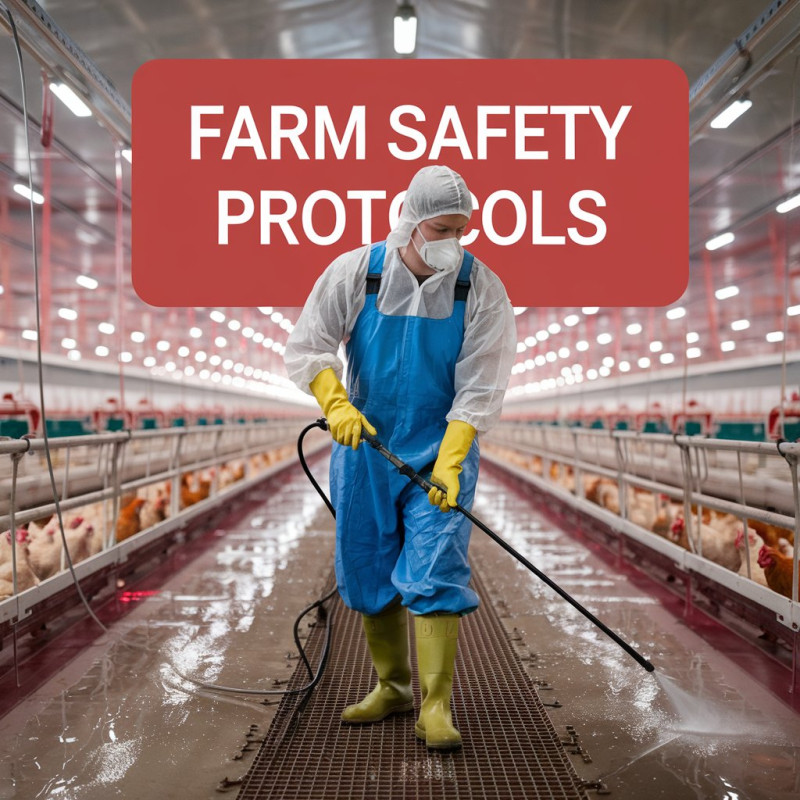Essential Biosecurity Measures Every Poultry Farmer Should Implement
Date : 2024-11-30
Poultry farming is a rewarding business, but it comes with its challenges, especially when it comes to managing disease outbreaks. Biosecurity is one of the most crucial aspects of poultry farming that helps prevent infections and ensures the health of your birds. Whether you’re managing a small backyard flock or a large commercial operation, implementing effective biosecurity measures is a must.
In this blog, we’ll cover the essential biosecurity practices that every poultry farmer should implement to protect their farm and maintain healthy poultry.
1. Secure the Perimeter of Your Poultry Farm
The first line of defense against disease is controlling access to your farm. Secure fencing around your poultry farm is essential to prevent wild animals, stray domestic animals, and unauthorized people from entering the premises. Wild birds can carry diseases such as avian influenza, while pests like rodents and insects can spread pathogens.
Actionable Tips:
Install high-quality fencing around the perimeter. Make sure gates are locked and monitored. Consider adding a barrier system like a double fence for added protection. |
2. Control Visitor Access
Limiting access to your poultry farm is crucial in preventing the introduction of diseases. Visitors can bring pathogens on their shoes, clothing, or equipment. This is particularly true for workers, veterinarians, or delivery drivers who frequently visit the farm.
Actionable Tips:
Establish a visitor protocol with mandatory handwashing and clothing changes. Set up designated entry points for staff and visitors. Require visitors to disinfect footwear and equipment before entering poultry houses. |
3. Implement Quarantine Procedures for New Birds
Introducing new birds to your flock can be risky, as they may carry diseases that haven’t shown symptoms yet. Quarantining new birds for at least 30 days before introducing them to your main flock allows you to monitor their health and avoid infecting your existing birds.
Actionable Tips:
Set up a separate quarantine area for new arrivals. Regularly monitor the health of quarantined birds. Ensure the quarantine area is isolated from the main farm to prevent cross-contamination. |
4. Maintain Strict Hygiene Practices
Proper hygiene is key to preventing the spread of disease in your poultry farm. Cleaning and disinfecting poultry houses, equipment, and tools should be done regularly. Pathogens thrive in dirty environments, so keeping your farm clean is essential to disease prevention.
Actionable Tips:
Clean and disinfect waterers, feeders, and egg cartons daily. Regularly remove waste and bedding from poultry houses. Use high-quality disinfectants that are effective against poultry diseases. |
5. Control Rodent and Insect Populations
Rodents, insects, and wild birds can be vectors for many diseases in poultry farms. Rodent control and regular pest management are vital in maintaining a biosecure environment. This includes controlling insects like mosquitoes and flies, which can carry viruses, and rodents that can spread bacteria.
Actionable Tips:
Set up traps and baits to control rodents. Use fly control methods such as fly traps or insecticides. Seal off gaps and cracks in buildings where pests can enter. |
6. Provide Clean Water and Quality Feed
Water and feed are the essential building blocks for healthy poultry. Contaminated water or feed can introduce harmful pathogens into your flock, leading to disease outbreaks. Ensuring your water sources are clean and your feed is stored properly helps prevent contamination.
Actionable Tips:
Use clean, treated water from a safe source. Store feed in air-tight containers to prevent contamination from pests. Regularly clean waterers and feeders to prevent the growth of bacteria. |
7. Practice Good Waste Management
Proper disposal of waste, including manure, bedding, and dead birds, is crucial to prevent disease spread. These materials can harbor pathogens and, if not properly handled, can contaminate the environment and other parts of the farm.
Actionable Tips:
Dispose of dead birds immediately using proper disposal methods like incineration or rendering. Store manure and waste in designated, enclosed areas. Compost or spread manure safely, away from poultry housing areas. |
8. Vaccinate Your Flock
Vaccination is one of the most effective ways to prevent disease outbreaks. Depending on the region and the specific risks of your area, you may need to vaccinate your poultry for diseases like avian influenza, Newcastle disease, and Marek's disease. Regular vaccinations ensure that your flock remains protected from common poultry diseases.
Actionable Tips:
Consult with your veterinarian to develop a vaccination schedule. Keep records of vaccinations to track which birds are protected. Follow vaccination guidelines provided by your local agricultural authorities. |
9. Monitor Bird Health Regularly
Regular health checks are essential for identifying signs of disease early. Early detection of sick birds allows for quick isolation and prevents the spread of illness to the rest of the flock. A good monitoring system ensures your birds stay healthy and any potential issues are addressed promptly.
Actionable Tips:
Implement daily health checks for all birds. Look for symptoms like loss of appetite, diarrhea, and labored breathing. Keep records of health observations to spot patterns and prevent issues. |
Conclusion
Biosecurity is not a one-time task—it’s an ongoing process that requires diligence and consistency. Implementing these biosecurity measures will help you prevent disease outbreaks, safeguard your poultry, and maintain a profitable farm. Regular monitoring, proper hygiene, and effective quarantine protocols are just the beginning. By making biosecurity a priority, you can ensure the long-term health and productivity of your flock.